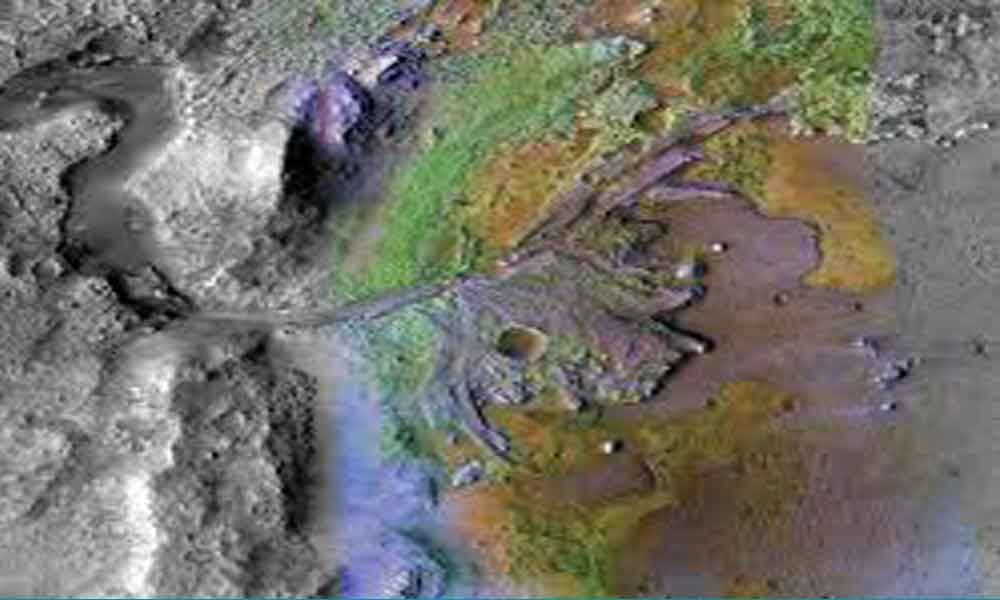Live
- Have time for jailed leaders but none for achievers: BJP slams Delhi govt over chess champion’s pain
- Alliance University holds 13th Convocation, 1145 students receive degrees
- SC orders strict action against illegal construction
- Man kills sibling over property dispute
- Karnataka gets third govt cardiology hospital
- Minister Ramalinga’s efforts help safeguard over 10,000 acres of temple Land
- Laxminarayan College gets NAAC B+ accreditation
- Champions Trophy: India vs Pakistan Match Likely to Be Held on This Date
- Tigress Zeenat spotted in Purulia
- Collectors asked for proper assessment of crop loss
Just In
Rivers may have flowed on Mars for longer than we thought


Water from rivers persisted on Mars much later into its history than previously thought, according to a study which found that the rivers on the Red Planet were wider than those on Earth today.
Water from rivers persisted on Mars much later into its history than previously thought, according to a study which found that the rivers on the Red Planet were wider than those on Earth today.
Riverbeds were carved deep into the Martian surface long ago, but the understanding of the climate billions of years ago remains incomplete.
Scientists at the University of Chicago in the US catalogued these rivers to conclude that significant river runoff persisted on Mars later into its history than thought.
The study, published in the journal Science Advances, showed that the runoff was intense -- rivers on Mars were wider than those on Earth today -- and occurred at hundreds of locations on the Red Planet.
This complicates the picture for scientists trying to model the ancient Martian climate, said Edwin Kite, assistant professor at University of Chicago.
"It's already hard to explain rivers or lakes based on the information we have. This makes a difficult problem even more difficult," Kite said. The constraints could be useful in winnowing the many theories researchers have proposed to explain the climate. Mars is crisscrossed with the distinctive tracks of long-dead rivers.
NASA's spacecraft have taken photos of hundreds of these rivers from orbit, and when the Mars rover Curiosity landed in 2012, it sent back images of pebbles that were rounded -- tumbled for a long time in the bottom of a river.
It is a puzzle why ancient Mars had liquid water, researchers said. Mars has an extremely thin atmosphere today, and early in the planet's history, it was also only receiving a third of the sunlight of present-day Earth, which shouldn't be enough heat to maintain liquid water.
"Indeed, even on ancient Mars, when it was wet enough for rivers some of the time, the rest of the data looks like Mars was extremely cold and dry most of the time," Kite said.
Seeking a better understanding of Martian precipitation, researchers analysed photographs and elevation models for more than 200 ancient Martian riverbeds spanning over a billion years.
These riverbeds are a rich source of clues about the water running through them and the climate that produced it.
For example, the width and steepness of the riverbeds and the size of the gravel tell scientists about the force of the water flow, and the quantity of the gravel constrains the volume of water coming through.
Their analysis shows clear evidence for persistent, strong runoff that occurred well into the last stage of the wet climate, Kite said.
The results provide guidance for those trying to reconstruct the Martian climate, he said. For example, the size of the rivers implies the water was flowing continuously, not just at high noon, so climate modellers need to account for a strong greenhouse effect to keep the planet warm enough for average daytime temperatures above the freezing point of water.
The rivers also show strong flow up to the last geological minute before the wet climate dries up. "You would expect them to wane gradually over time, but that's not what we see," Kite said.
The rivers get shorter -- hundreds of kilometers rather than thousands -- but discharge is still strong. It is possible the climate had a sort of "on/off" switch, which tipped back and forth between dry and wet cycles, Kite said.

© 2024 Hyderabad Media House Limited/The Hans India. All rights reserved. Powered by hocalwire.com






